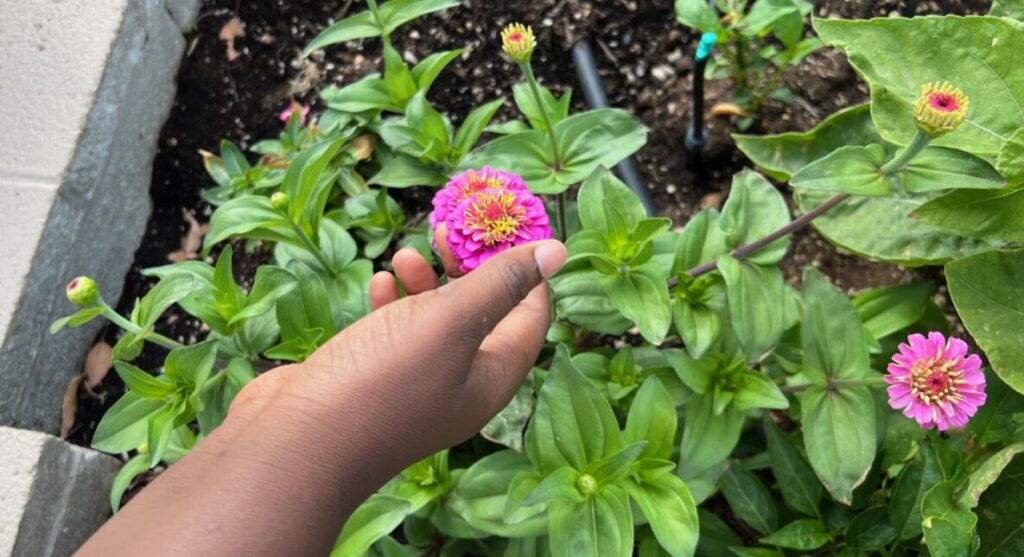
Professor Jill Litt, PhD, at the University of Colorado, believed that the benefits of gardening were real and measurable. She and her team set out to do just that, in what they believe to be the first-ever randomized-controlled trials of community gardeners. The study cataloged significant scientific evidence for what we observe regularly at Nevada HAND communities: gardening grows so much more than plants. Children and adults who plant and tend a garden improve their health and wellness while deepening their sense of connection to the world and their community.
Nevada HAND currently has community gardens at select family and senior properties. Resident volunteers make use of supplies and community partnerships provided by Resident Services to cultivate raised, irrigated beds located in their community’s outdoor common spaces. As Assistant Director of Resident Services Brittani Gray shared, the gardens provide community beautification, but more importantly, they encourage resident investment and engagement that leads to health and wellness benefits for all ages.
“It’s a shared backyard experience. Seeing it [the garden] when you walk out your front door, remembering the planting, feeling proud to show off something you have personally cared for. It’s very rewarding.” ~ Brittani Gray, Nevada HAND Assistant Director of Resident Services
Cultivating Health
At senior communities, the gardens offer an opportunity for personal expression, encourage a healthy outdoor activity routine, and help build community between expert volunteers and novice gardeners. Among the senior gardeners, Residents Services team members consistently observe lowered stress and isolation levels, improved mood, and new connections between neighbors.
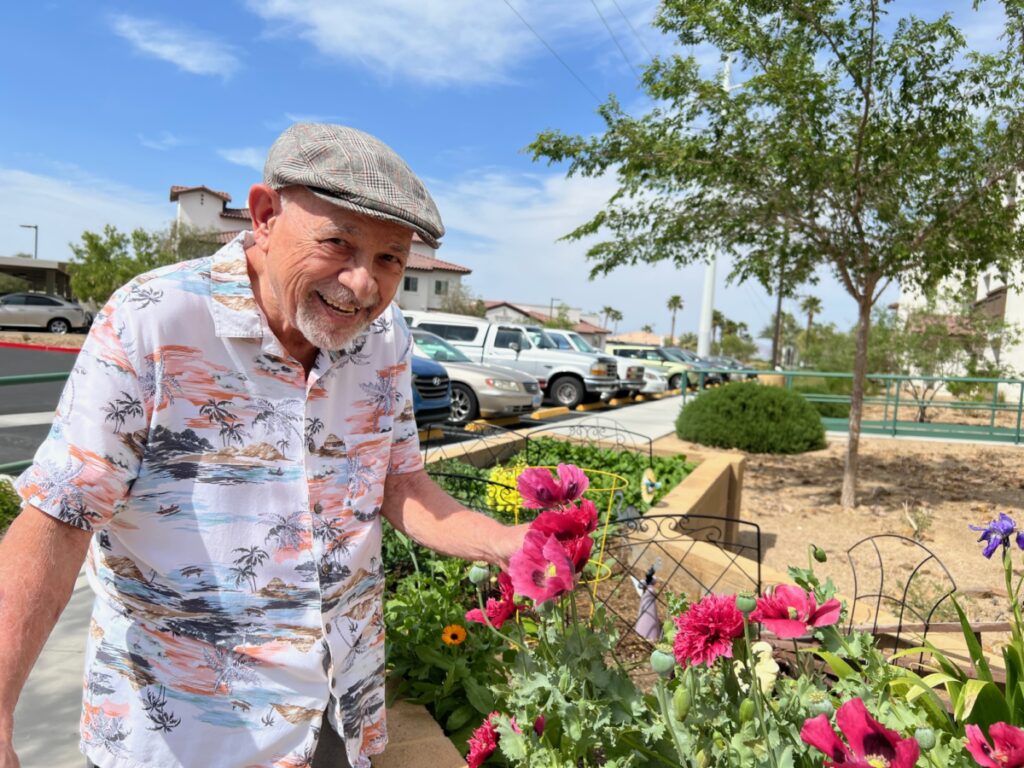
“For me, it’s meditation.” ~ Michael Sbei, Nevada HAND Resident
Westcliff Pines senior community resident, Michael Sbei, has been a community gardener since he became a Nevada HAND resident. Mr. Sbei helped start the garden at Decatur Pines and did the same when he moved to Westcliff in 2015.
Mr. Sbei’s love of growing things is a lifelong passion. “My father is from Italy. He was a ‘truck farmer’ — the family grew and sold vegetables. I’ve had my own landscaping business and worked in the nursery business as well as agriculture. [Gardening] is very meditative; it’s connecting with the universe; it’s connecting with the soil. For me, it’s meditation. I’m an artist; I also paint. So, my gardens look like canvases. In the winter, it’s more flowers, and in the summer, I do both flowers and vegetables.”
In his volunteer role, Mr. Sbei helps pass on his love of gardening to others in the community. “If they show interest, I want them to enjoy it. Everyone is at different stages. It’s fun to watch people evolve and enjoy it.”
Growing Community
At family communities, the gardens are an educational opportunity for children, helping them understand where food comes from, how plants respond to different environmental factors, and the unique satisfaction of enjoying a flower or vegetable you helped grow from seed. At select family communities, Nevada HAND partners with a local grassroots organization, The Bee Hive, to help children plant and cultivate the gardens, learn about healthy foods, and even try new recipes using the vegetables they have grown.
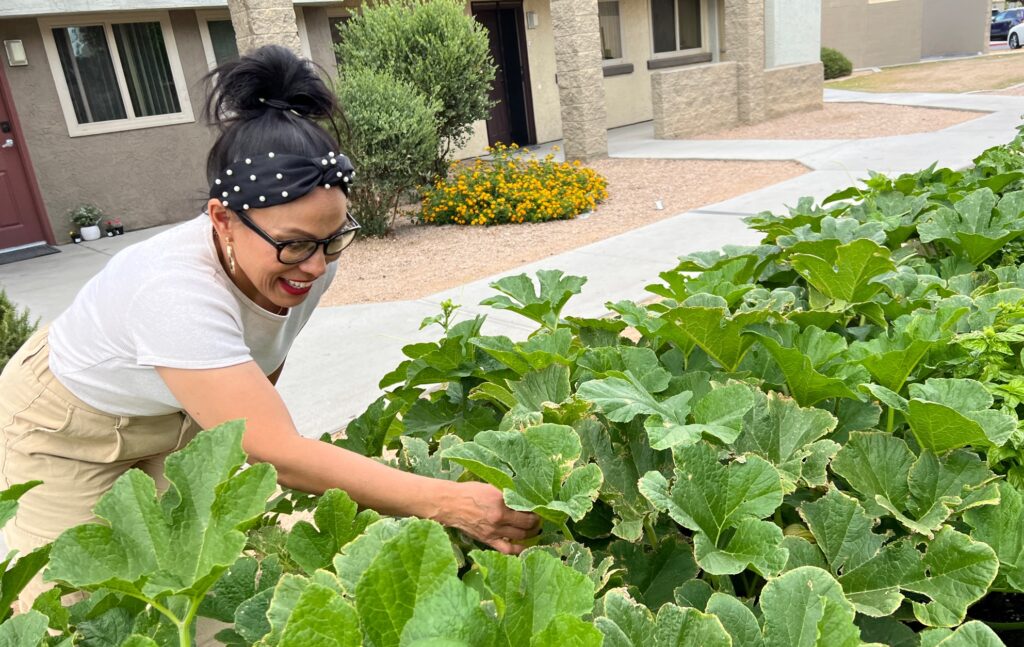
“For me, that’s what love is, reaching out to see how I can help. We keep doing it, and it will catch on.” ~ Bridget Ganigan, Founder of The Bee Hive, a Nevada HAND community partner
First, what is The Bee Hive?
“We’re an organization of women and teens, and we have recently added ‘tiny bees,’ younger girls. Every month, a Bee chooses a mission that is close to their heart, in support of their local community. We support them with supplies and skills development.”
How did the organization begin? And how did you connect with Nevada HAND?
“When I first moved to Las Vegas in 2003 from Hawaii, I was missing my community and the spirit of Aloha, so my husband encouraged me to build the community I was missing. I grew up on my grandfather’s land in Hawaii. You could eat from that land. And if we didn’t have something, our neighbors had it and we could trade. So we started with one idea: ‘Let’s feed the community, let’s help like we would in Hawaii.’ We started small, with our own children, making sandwiches for people experiencing homelessness. Friends became interested and started helping, then more family moved here and joined. And soon we had 30 people helping. Then we started looking for other ways to help. This grew, and about five years ago I had the idea of forming The Bee Hive — all the bees have to work together. We started meeting once a month and doing person-to-person outreach for donations. We have made a lot of good relationships.”
“One of The Bee Hive members used to own a party hall behind [Nevada HAND community] Bonanza Pines. She called to offer flowers left over from a party, and we decided to take them to senior residents at Bonanza Pines. The residents loved it; we loved it. We got in contact with the Bonanza Pines team and [Director of Resident Services] Marissa Shoop to do more. It grew from there to include activities like food deliveries at Thanksgiving, and eventually gardening with the children!”
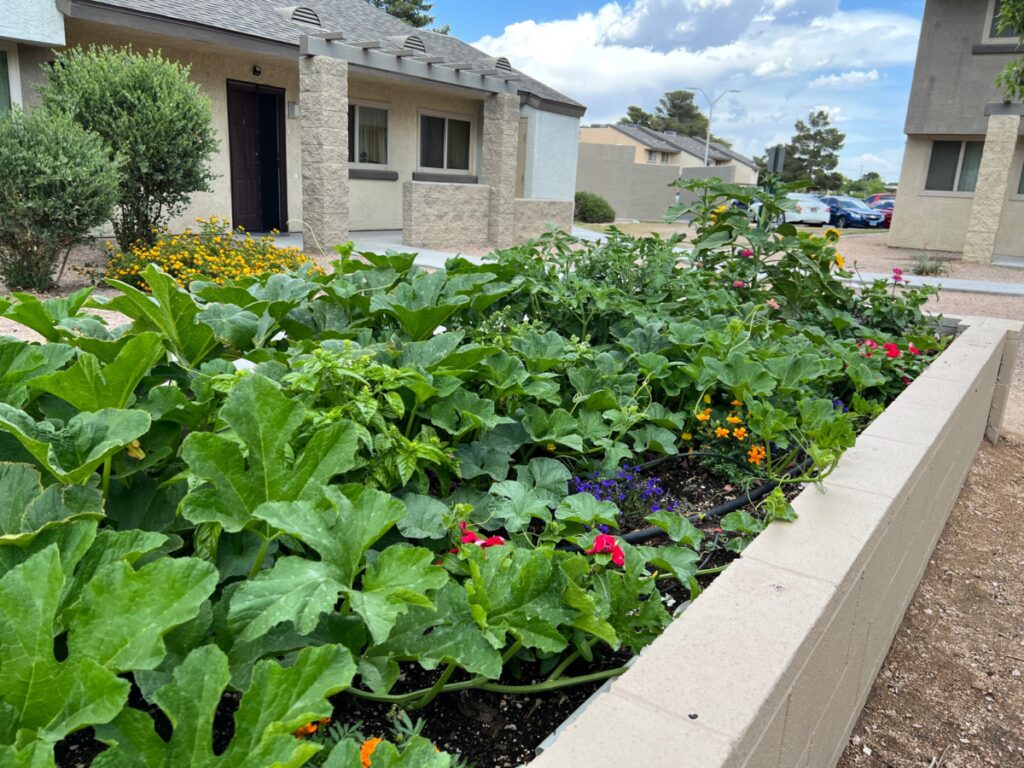
How do you structure the community garden program for children living at Nevada HAND communities?
“From my experience as an Early Childhood Director, I knew that kids need to learn where their food comes from, to taste fresh vegetables. We started the program by asking the kids where they thought a vegetable came from. And they said, ‘Albertson’s.’ So we start with ‘Yes, it got shipped there, but where does it come from?’ We show them that it starts from a seed. One of my former preschool parents has a seed library [East Las Vegas Seed Share] and has earned her horticulture certificate; she has joined us in this program to educate the children about how seeds react to the soil, the water, the shade, and more. We have the kids touch the dirt, use positive talk, and nurture the seeds. We guide them where to plant, explaining how the bees are drawn to the flowers and pollinate the veggies.”
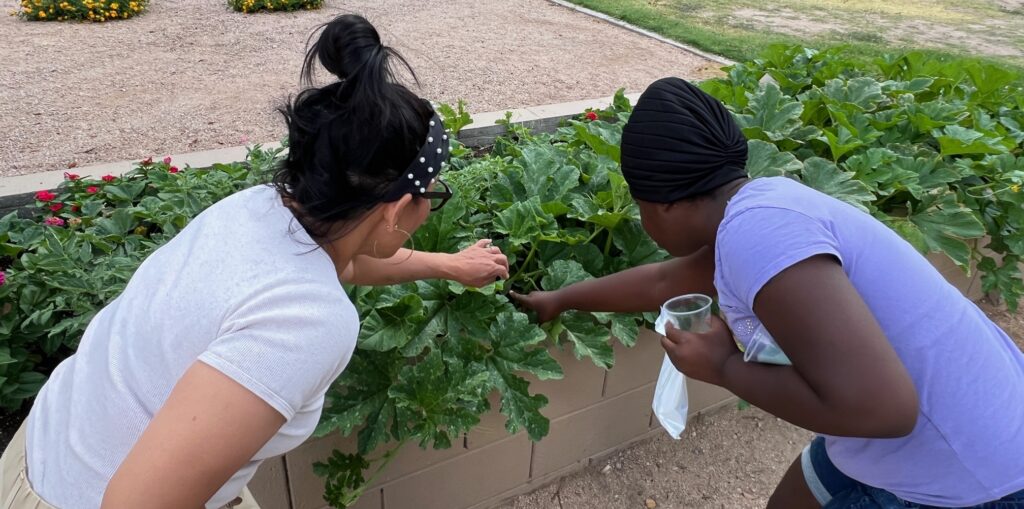
What do you love about working with community gardens at Nevada HAND communities?
“I see the same kids coming back each year. Even as kids get older, they continue, and the younger kids love to garden and learn with the older kids’ help. The more we do the program, the more we see parents joining their kids and children even taking small potted plants to grow in their homes. The garden teaches patience. It doesn’t grow overnight. You have to check it every day, give it love. I think it’s an amazing way to keep people looking for something new, and looking to tomorrow.”






